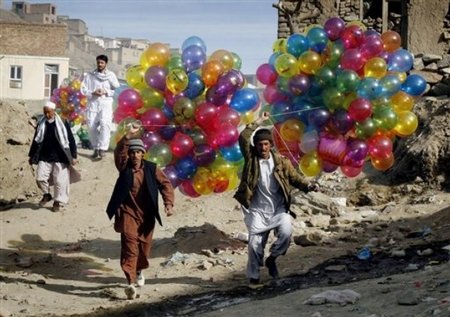
The Persian new year was celebrated in Afghanistan just over a week ago. With it's passing, millions of wood-burning stoves have been relegated to storage and spring has officially arrived. Budding rose bushes and apricot trees dot Kabul courtyards.
But spring also heralds the return of the insurgent fighting season. The retreating cold releases its grip on supply routes to safe-havens across the mountainous Pakistani border, while the increasingly dense foliage provides impressive cover from NATO and U.S. fire.
There is hope, however, in both Washington and Kabul, that this spring will mark a new year that breaks the rhythm of war in Afghanistan. President Barack Obama's 30,000 troop surge, which came into place last fall, along with General David Petraeus' renewed focus on special operations and the continued enlargement of the Afghan National army have secured a handful of strategic districts in the country's restive south for the first time in years. Cricket diplomacy between Pakistan and India could pave the way toward Pakistan playing a more constructive role in negotiations with Afghanistan's Taliban. And fallout from the corruption scandal at Afghanistan's biggest bank may push forward reforms and introduce some semblance of accountability in the Karzai government. Just last fall, six in ten Afghans said the country was moving in the right direction.
Granted, expectations should be tethered. The afghan public is weary of the foreign military presence and gruesome pictures of a U.S. "kill team" do little to allay the fears of civilian casualties, which reached a high water mark last year. Moreover, this past winter proved more violent than most, a disturbing portent for the coming year. Barely a week into the new year, 300 Taliban - yes, 300 - overran an entire district in eastern Afghanistan.
Only a day before the Taliban invasion from the east, Laura King wrote this in the L.A. Times:
In addition, the spring will test a gamble by the North Atlantic Treaty Organization force in eastern Afghanistan, where U.S. troops are being withdrawn from areas once described as crucial bulwarks against Pakistani-based militant groups such as the Haqqani network and the Hezb-i-Islami faction led by Gulbuddin Hekmatyar.
U.S. troops have been "repositioned" away from former battlegrounds such as the Pech and Korangal valleys in Kunar province, where commanders said sophisticated surveillance and "intelligence-driven" raids would prevent a rush of cross-border movement.
Should old acquaintance be forgot, indeed.
(AP Photo)



